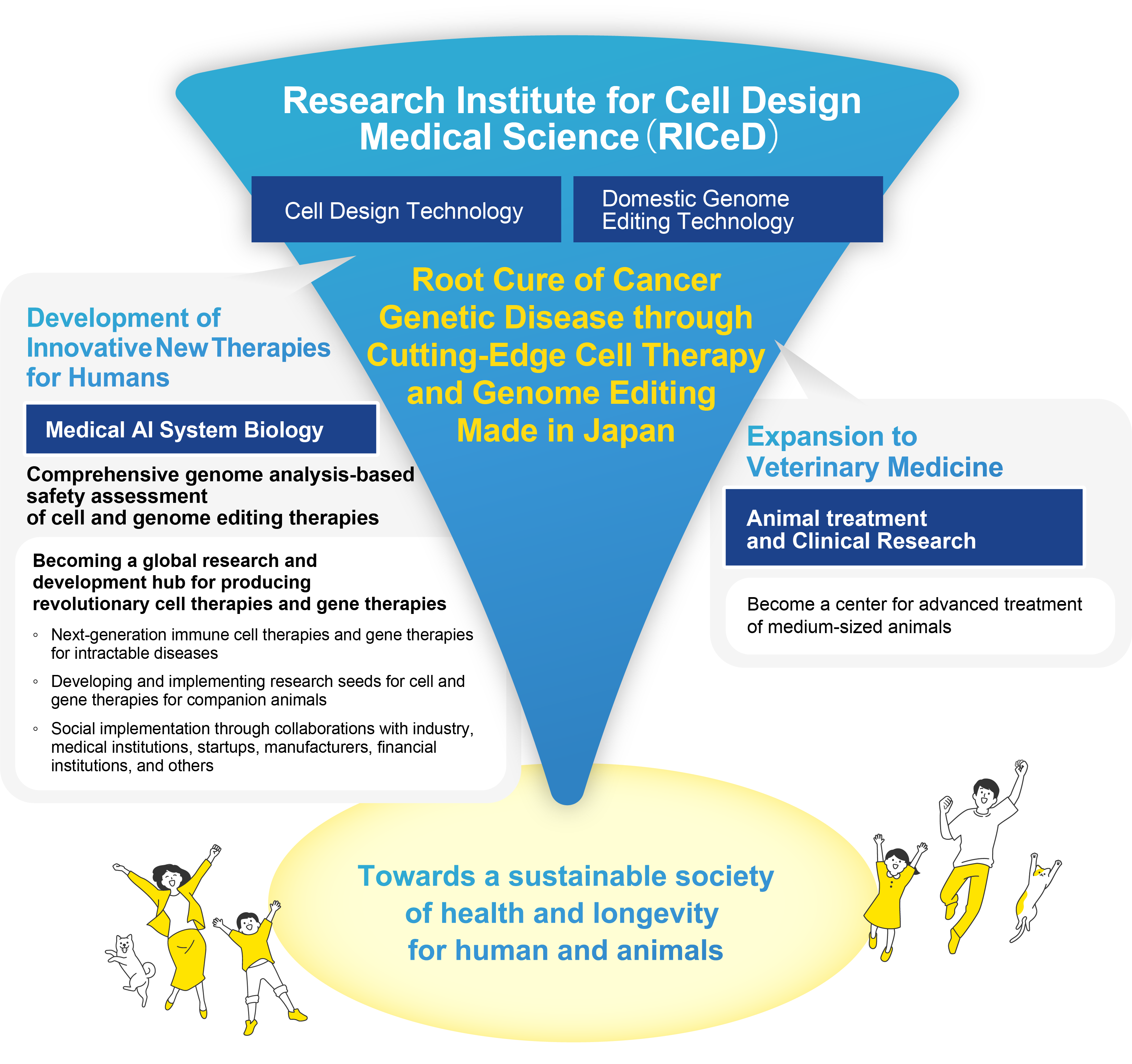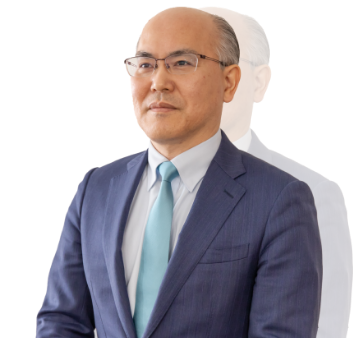01.
Background of the Establishment of the Research Institute for Cell Design Medical Science(RICeD)
RICeD was established in2023, evolving from two interdisciplinary research centers: the Regenerative and Cellular Therapy Research Center, which was launched in 2016, and the Advanced Genome Editing Therapy and Drug Discovery Research Hub, which was established in 2022.
02.
Initiatives of the Regenerative and Cellular Therapy Research Center
The Regenerative and Cellular Therapy Research Center has been conducting the following initiatives with support from Yamaguchi Prefecture’s “Regenerative Medicine Research and Development Hub Function Enhancement Project” (since 2016).
・Clinical development of research seeds
・Development of cell culture-related technologies, including the automation of medical cell culture devices
・Training of highly specialized personnel through the first graduate program at a national university, “Clinical Cell Culture Specialist Training Course for Regenerative Medicine and Cellular Therapy”
03.
Research Achievements and Results through Industry-Academia-Government Collaboration
In collaboration with various companies, we have successfully secured funding from several key programs, such as the Japan Science and Technology Agency (JST) “COI-AS,” and the Japan Agency for Medical Research and Development (AMED) programs including the “Project for Cancer Research and Therapeutic Evolution (P-CREATE)” and the “Practical Research for Innovative Cancer Control.” Notably, in the Ministry of Education, Culture, Sports, Science and Technology (MEXT) grant program “Regional Innovation Ecosystem Formation Program” (FY 2017–FY 2021), we were selected through a joint application with Yamaguchi Prefecture.
Through industry-academia-government collaboration, we have been working on “exploring and creating markets for unmet medical needs based on innovative core medical technologies.” In the final evaluation, our achievements were recognized, including the physician-led clinical trial of an “autonomous liver cirrhosis regenerative therapy” (1 case), clinical trials of PRIME CAR-T cell therapy (3 cases), and the training of clinical cell culture specialists, earning the highest “S” rating.
04.
Advanced Genome Editing Therapy and Drug Discovery Research Project Initiatives
The Advanced Genome Editing Therapy and Drug Discovery Research Project, supported by AMED’s “Drug Discovery Support Promotion Project: Drug Discovery Booster” and other programs, has been promoting clinical development of drug discovery through organized medical-veterinary collaboration using domestically produced advanced genome editing technology for genetic intractable diseases caused by genome sequence variation. In addition, through a comprehensive collaboration agreement with the Center for Genome Editing Innovation at Hiroshima University (Director: Taku Yamamoto), we are engaged in research on the implementation of domestically produced genome editing technology in medicine and veterinary medicine.
05.
The Future Vision of RICeD
Research Institute for Cell Design Medical Science(RICeD), which was established to expand and develop a solid foundation for the creation of outstanding domestic medical technologies and the implementation of research results in society through these research and development activities, will further strive for the development of innovative treatments for intractable diseases such as cancer and genetic diseases and the deployment of drug discovery. The Cell Design Medical Science Institute was established to expand and develop a solid foundation for the implementation of socially responsible medicine.
In addition, by creating cutting-edge medical technologies and applying the research results to companion animals, while building a positive cycle that feeds those outcomes back into human medicine, we aim to cure many patients. Furthermore, we are committed to contributing to the creation of a society where humans and companion animals can live long, healthy lives together in harmony.

Yamaguchi University Research Institute for Cell Design Medical Science(RICeD)
Director
Koji Tamada

RICeD was established in October 2023 as an interdisciplinary fusion of the Center for Regenerative Medicine and Cell Therapy (established in 2008) and the Center for Advanced Genome Editing Therapy and Drug Discovery (established in 2022), which have been working as part of the University Research Promotion Organization, a university-wide organization of Yamaguchi University. The Institute was established in October 2023 as an interdisciplinary research institute.
The Institute brings together researchers engaged in cutting-edge basic research, clinical development, and data science research in the fields of medicine and veterinary medicine, aiming to develop new drugs for humans and companion animals and foster highly specialized medical professionals by utilizing Yamaguchi University’s world-leading cell design technology and genome editing technology. In addition, the institute organically collaborates with local governments, university-launched star-up companies, pharmaceutical companies, manufacturers, VC firms, financial institutions, and other industrial sectors to realize effective R&D through mutual feedback of clinical research results on humans and animals, with the aim of building a circulatory innovation ecosystem for medicine and veterinary medicine originating in Yamaguchi. We are aiming to build a medical-veterinary cyclical innovation ecosystem from Yamaguchi.
The Institute consists of four divisions: the Advanced Cell Therapy Research Division, the Advanced Genome Editing Therapy Research Division, the Medical and Veterinary Translational Clinical Research Division, and the Systems Medicine Information Research Division. In addition, by working together with industry, academia, and government, the institute will promote the creation of university-launched start-up companies, the attraction of companies, and the formation of bases for advanced treatment of medium-sized animals, aiming to solve international issues in the field of human and animal healthcare while contributing to regional development. In addition, the institute will foster young researchers who aspire to basic and clinical research in the fields of medicine and veterinary medicine. The Institute widely promotes collaboration with many researchers, research institutions, and companies, and we sincerely hope that researchers and organizations interested in our activities will actively participate.
We hope that a diverse group of people will gather at our institute and grow together in a free and open atmosphere of mutual cooperation and the world’s most advanced cell design research and development.
